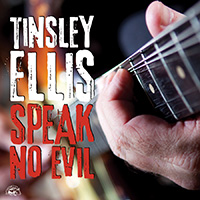
www.myspace.com/chicagobluesguide Your Complete Guide to the Chicago Blues Scene
 www.myspace.com/chicagobluesguide Your Complete Guide to the Chicago Blues Scene |
|
ABOUT THE GUIDE ●clubs ●bands ●radio shows ●record labels ● EVENTS NEWS FEATURES REVIEWS ●Live Shows PHOTOS CONTACT
|
Tinsley Ellis Speak No Evil Alligator Records  by Mark Baier
Over
the last 25 years, few guitarists have put more miles on the Econoline
than Tinsley Ellis has. With a resume that includes performances in all
50 states as well as four continents, Ellis has left countless audiences
drenched in sweat from the rhythm and feral power of his music. His
eighth Alligator release Speak No
Evil shows Ellis at the height
of his creative potency, delivering a collection of songs that
fuse equal parts Fillmore with Mississippi Delta mud. While this record
clearly intends to rock, the red clay of Tinsley’s Georgia roots is
never far from the surface when the volume is turned up and Ellis lets
loose on the 12 tracks included on
Speak No Evil.
With
the crack of a snare and a yowl from a wide open “wah wah”,
Speak No Evil wastes no time
getting started, opening up with the rollicking “Sunlight of Love”. Its
aggressive and exhilarating guitar lines serve notice that this is not
just another blues record. Speak
No Evil is all about loud riff heavy blues/rock. Utilizing a
generous pallet of vintage guitar tones, Ellis applies it in thick
liberal doses, creating a complex and textured sonic painting in the
process. “Slip and Fall,” “The Other Side,”
“The Night Is Easy” and “Loving
For Today” are terrific up tempo rockers with heavy riffs that come at
you like sharks in a feeding frenzy. The solo breaks are always melodic
yet aggressive, explosive and controlled. No notes are wasted, and none
are needed, as every chord and guitar figure seem perfectly balanced to
serve the song. Two standout tracks are “The Night is Easy” and
“Amanda”. Both songs are immersed in big analog guitar tones and are
densely packed with passionate riffs, sharp as a razor’s edge. The aural
landscape is controlled and explosive; orchestral in its impact. The
sonic craftsmanship evident here is very impressive. Throughout the
recording, the snare of Jeff Burch and the bass of “The Evil One” erupt
like perfectly placed M-80’s, laying down a tracker beam of voodoo
groove to which Tinsley applies the electric sonic sauce.
There are a couple quieter turns as well. “It Takes What it Takes”
floats above the beautifully conceived twin guitar lines that belies
Ellis’s southern-fried roots, and “Cold Love, Hot Night” with its minor
key changes and memorable chorus, would be the A- side of a hit 45 in a
bygone era.
While this is clearly an appealing recording for fans of superior string
stretching, the vocal ability demonstrated by Ellis is notable as well.
His smoky expressive style can be delicate and rough. There is a
tenderness and grit to his delivery that is easy and sure, with a
control of phrasing and melody that is a treat to listen to in an era
where appearances are often more important than substance.
Ultimately, the power and impact of
Speak No Evil is in its
ability to invoke the best of the Fillmore era without aping it. While
clearly reminiscent of classic era power rock like Cream, Traffic and
Hendrix, Speak No Evil stands
with those seminal sounds as an equal rather than a retread. Any one of
the songs on Speak No Evil
could have been released in 1968, and our kids would be playing them
today on Guitar Hero. It’s
weight and substance as an artistic whole speak to Ellis’s deep
understanding for the same roots music that was so important to the ’60s
rock pioneers who opened the doors to a world of music most Americans
didn’t know existed. Night after night, Tinsley Ellis is traveling the
world reminding audiences why they fell in love with the blues, one
blistering rocking song at a time.
### |
|
|